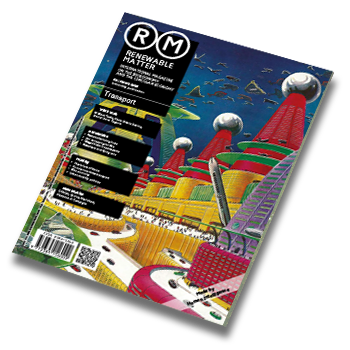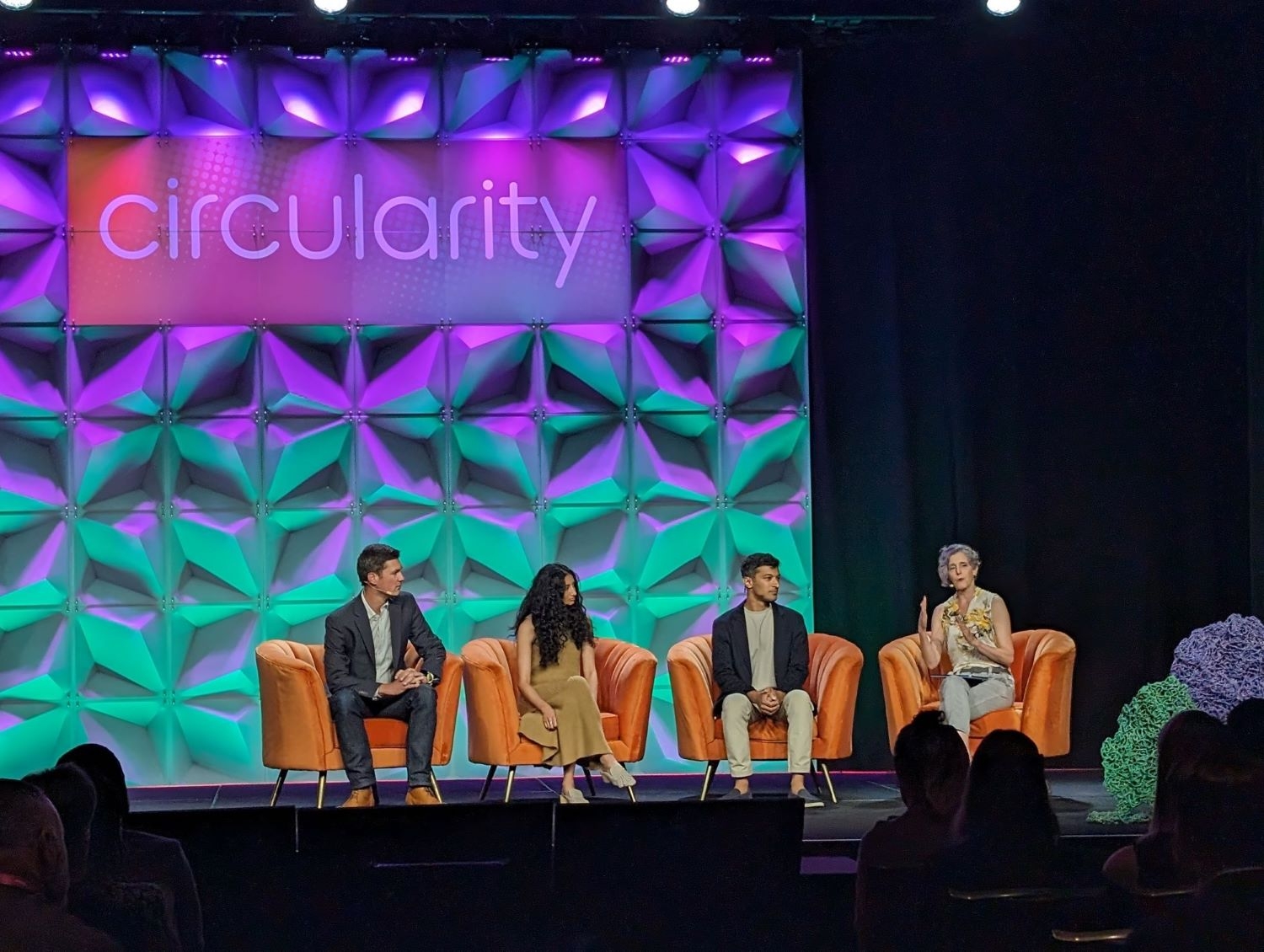From Chicago – After three intense days of work, the 2024 edition of Circularity ended on Friday, the 24th of May. This year, however, the story of the premier circular economy conference in the United States begins differently. The perfect opening is the fairy-tale phrase "once upon a time." While this expression is typically used for stories with happy endings, that's not why it was chosen. In the case of Circularity 24, "once upon a time" signifies a turning point, because, at least in intention, the old idea of the circular economy seems to be a thing of the past in the United States.
From the stage in Chicago, the message comes through loud and clear: from now on, circularity should no longer be just about plastic, sustainable packaging, and reputation. From critical raw materials and the launch of new coalitions to textiles, from soil regeneration to public policies, the current focus is on a different model of the circular economy, one that is more aware of the limits and impacts of the transition, while also paying attention to Europe.
A model that aims for global supply chains to evolve and open, transforming into supply networks. A model where prosperity and communities advance hand in hand. But, above all, a model where finance embraces its role as a catalyst without hesitation. The reason is soon stated: to sum up the numerous interventions, innovation and pilot projects can emerge anywhere, but scalability requires collaboration.
Speakers and news from Circularity 24
Anyone who has ever been involved in the circular economy knows that showcasing solutions is both the norm and the cornerstone of any conference, be it national or international. And at Circularity 24, this was no exception. Particularly given the audience, comprised of venture capitalists, CEOs, sustainability managers, and communications experts from the world's leading multinationals (just to name a few: HP, IKEA, BASF, Coca-Cola, Boeing, DOW, but also consultancies such as Deloitte, McKinsey, and KPMG). Standing out among the speakers was certainly Garry Cooper, CEO and co-founder of Rheaply, an exchange platform that assists organisations in visualising, quantifying, and optimising their materials and resources, thereby facilitating their reuse and thus promoting circular procurement. Cooper also serves on the board of P33 Chicago, an initiative aimed at fostering technology growth in the metropolis.
Continuing with the topic of computers and data, it was Greg Mulholland (Founder and CEO of Citrine Informatics), Zahra Biabani (CEO of IntheLoop AI), and Areeb Malik (Co-founder and CTO of Glacier) who explored the application of artificial intelligence in the circular economy. The advice to companies present was unanimous: utilise small, purpose-built models instead of training AI supermodels; outsource development to avoid energy and development costs; and pay attention to data quality.
In a speech under the banner of pop culture in the time of climate change, Mignon Senuta, Senior Director, Sustainability and Social Impact at Mattel, explained ways to evolve consumer trust in the brand in an era of climate anxiety. Among the novelties emerged Sway, a California startup led by Julia Marsh, which uses seaweed to create compostable substitutes for single-use plastic packaging. Instead, the winner of the pitch session was the innovative startup Mycocycle. Its patent-pending process aims to enhance the natural functions of fungi to transform construction waste into low-carbon raw materials for the built environment.
Moving back to toys and reuse, among the new products this year was Unless Kids. “Ours is a two-way logistics platform that offers parents a convenient, fun, and sustainable way to buy the toys their children want and get rid of the ones they no longer play with,” Nic Esposito, Founder of Circa System, the company that owns the platform, tells Renewable Matter.
The Circular Supply Chain Coalition
During the first day of Circularity 24, FedEx, Pyxera Global, Sustain our Future, and Metabolic officially launched the Circular Supply Chain Coalition. This new collaboration aims to create economies and efficiencies of scale in the reverse logistics of critical minerals by closely engaging—from a global to a local geopolitical perspective—those communities at risk of being cut off from the benefits of a circular economy.
“We can establish a supply chain that connects local to global supply chains in a manner that benefits communities,” says Jennifer Carrigan, Associate Director for Sustainability at Pyxera, to Renewable Matter. “We trialled a few ideas through a pilot project and have now come to develop the full program. The large-scale implementation of this program will involve small businesses and social enterprises working together within the electronics supply chain through an integration model: some will handle dismantling, others will manage repairs, and some will focus on reuse. We will coordinate them so that they are co-opted together. Subsequently, they will sell the materials to a larger manufacturer, who will pay through a forward procurement mechanism, a modified PPA.”
Among these producers is the start-up American Battery Technology Company, which specialises in battery recycling. “Collaborating with coalition members and through community-focused public-private partnerships is essential to closing the loop on a truly sustainable battery metals supply chain in North America,” says Tiffiany Moehring, Head of Communications and Marketing at American Battery Technology Company. “Consumer electronics in the United States are notoriously difficult to collect, aggregate, and recycle efficiently.”
“Providers in the logistics sector play an essential, yet often little-discussed, role in supporting the expansion of the circular economy,” commented Brandon Tidwell, Principal Global Citizenship & Sustainability at FedEx, to Renewable Matter. “Frequently, product users or re-users of components in the next stage of the circularity journey are not near the infrastructure needed for sorting, disassembling, or reusing existing materials. Electronic waste offers significant opportunities for circularity, which is why FedEx focused its efforts on an initial recycling pilot project in Tennessee last year with Pyxera Global. Now, as an Implementation Partner of Pyxera's Circular Supply Chain Coalition, we hope to bring our logistics expertise to the table along with other stakeholder voices to make expanded circularity more feasible throughout the United States.”
The European Union and the United States move closer on the circular economy
It is now evident that the European Union and the United States are closely observing each other, particularly in the realm of circular resource management (remember, the term "waste" is banned at Circularity24!). For example, on the 21st of May, Minnesota became the fifth US state to pass a law establishing an extended producer responsibility scheme for packaging, a model that is well established in Europe, a regulatory “superpower.” Additionally, collaboration is strong on other key areas within the European Circular Economy Action Plan, such as critical raw materials.
This was confirmed by the presence at Circularity 24 of Manuel Carmona Yebra, Deputy Head of Section for Global Issues and Innovation of the European Union delegation to the US. “We have partnered with the US to lead the Minerals Security Partnership because it is vital for Europe as well,” says Carmona Yebra to Renewable Matter.
The trade initiative is led by Washington and involves countries such as Canada, Australia, Finland, France, Germany, Japan, the Republic of Korea, Sweden, the United Kingdom, and Italy. “We are also establishing a set of common standards based on the Circular Economy Action Plan. We are focusing on product design, reuse principles, and recycled content. All of this is being translated into law in Europe. My role here is to raise awareness among companies. We also utilise regular meetings at the EU-US Trade and Technology Council level. This past January, we provided a set of recommendations. Therefore, we are in contact not only with administrations regarding these circular economy standards but also with industries overseas, which is critical. We want to ensure that our trade, which is the most important trade relationship in the world, continues to grow and prosper, but is also circular.”
Circular cities: the example of Austin, Texas
US cities are becoming increasingly active in the circular economy. In Texas, Austin is making significant progress in promoting a closed-loop model, focusing on sustainability and waste reduction through various programmes. Furthermore, it aims to collaborate more closely with other cities to support and encourage circular economy innovation throughout the region.
“The challenges for Texas' circular economy include the distances between major metropolitan areas and the lack of access to funding to implement circular economy initiatives,” Madelyn Morgan, Conservation Program Coordinator for the City of Austin Resource Recovery's Circular Economy Program, tells Renewable Matter. The city's goal is to achieve zero waste by 2040, which means reducing the amount of waste sent to landfills by 90%.
For Austin, the circular economy has three main priorities: supporting circular business innovation, leading by example as an organisation, and encouraging residents to engage in reuse and repair behaviours by expanding access to opportunities and education. For example, among the promoted initiatives are incentives for developing reuse infrastructure. “A challenge in moving to an open reuse system is the lack of standards. As different reuse service providers expand their services nationwide into closed-loop systems, it is important to have agreement among industry and community leaders. This could include standards related to material factors such as packaging design, container colours, and collection standards that could improve communication and public participation,” Morgan concludes.
This article is also available in Italian / Questo articolo è disponibile anche in italiano
Images: © Giorgio Kaldor. Cover image: Heather Clancy, Greg Mulholland, Zahra Biabani, Areeb Malik



